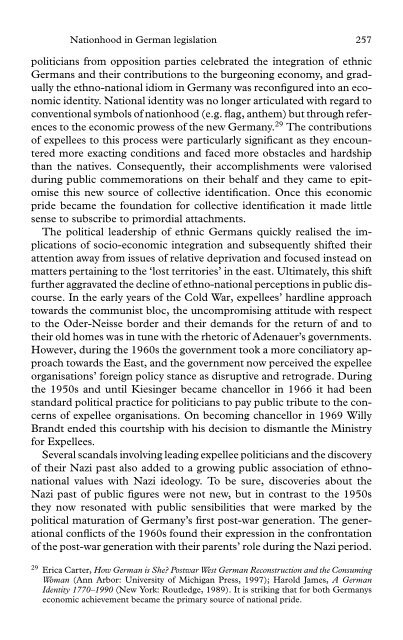Memory and Power in Post-War Europe: Studies in the Presence of ...
Memory and Power in Post-War Europe: Studies in the Presence of ...
Memory and Power in Post-War Europe: Studies in the Presence of ...
Create successful ePaper yourself
Turn your PDF publications into a flip-book with our unique Google optimized e-Paper software.
Nationhood <strong>in</strong> German legislation 257<br />
politicians from opposition parties celebrated <strong>the</strong> <strong>in</strong>tegration <strong>of</strong> ethnic<br />
Germans <strong>and</strong> <strong>the</strong>ir contributions to <strong>the</strong> burgeon<strong>in</strong>g economy, <strong>and</strong> gradually<br />
<strong>the</strong> ethno-national idiom <strong>in</strong> Germany was reconfigured <strong>in</strong>to an economic<br />
identity. National identity was no longer articulated with regard to<br />
conventional symbols <strong>of</strong> nationhood (e.g. flag, an<strong>the</strong>m) but through references<br />
to <strong>the</strong> economic prowess <strong>of</strong> <strong>the</strong> new Germany. 29 The contributions<br />
<strong>of</strong> expellees to this process were particularly significant as <strong>the</strong>y encountered<br />
more exact<strong>in</strong>g conditions <strong>and</strong> faced more obstacles <strong>and</strong> hardship<br />
than <strong>the</strong> natives. Consequently, <strong>the</strong>ir accomplishments were valorised<br />
dur<strong>in</strong>g public commemorations on <strong>the</strong>ir behalf <strong>and</strong> <strong>the</strong>y came to epitomise<br />
this new source <strong>of</strong> collective identification. Once this economic<br />
pride became <strong>the</strong> foundation for collective identification it made little<br />
sense to subscribe to primordial attachments.<br />
The political leadership <strong>of</strong> ethnic Germans quickly realised <strong>the</strong> implications<br />
<strong>of</strong> socio-economic <strong>in</strong>tegration <strong>and</strong> subsequently shifted <strong>the</strong>ir<br />
attention away from issues <strong>of</strong> relative deprivation <strong>and</strong> focused <strong>in</strong>stead on<br />
matters perta<strong>in</strong><strong>in</strong>g to <strong>the</strong> ‘lost territories’ <strong>in</strong> <strong>the</strong> east. Ultimately, this shift<br />
fur<strong>the</strong>r aggravated <strong>the</strong> decl<strong>in</strong>e <strong>of</strong> ethno-national perceptions <strong>in</strong> public discourse.<br />
In <strong>the</strong> early years <strong>of</strong> <strong>the</strong> Cold <strong>War</strong>, expellees’ hardl<strong>in</strong>e approach<br />
towards <strong>the</strong> communist bloc, <strong>the</strong> uncompromis<strong>in</strong>g attitude with respect<br />
to <strong>the</strong> Oder-Neisse border <strong>and</strong> <strong>the</strong>ir dem<strong>and</strong>s for <strong>the</strong> return <strong>of</strong> <strong>and</strong> to<br />
<strong>the</strong>ir old homes was <strong>in</strong> tune with <strong>the</strong> rhetoric <strong>of</strong> Adenauer’s governments.<br />
However, dur<strong>in</strong>g <strong>the</strong> 1960s <strong>the</strong> government took a more conciliatory approach<br />
towards <strong>the</strong> East, <strong>and</strong> <strong>the</strong> government now perceived <strong>the</strong> expellee<br />
organisations’ foreign policy stance as disruptive <strong>and</strong> retrograde. Dur<strong>in</strong>g<br />
<strong>the</strong> 1950s <strong>and</strong> until Kies<strong>in</strong>ger became chancellor <strong>in</strong> 1966 it had been<br />
st<strong>and</strong>ard political practice for politicians to pay public tribute to <strong>the</strong> concerns<br />
<strong>of</strong> expellee organisations. On becom<strong>in</strong>g chancellor <strong>in</strong> 1969 Willy<br />
Br<strong>and</strong>t ended this courtship with his decision to dismantle <strong>the</strong> M<strong>in</strong>istry<br />
for Expellees.<br />
Several sc<strong>and</strong>als <strong>in</strong>volv<strong>in</strong>g lead<strong>in</strong>g expellee politicians <strong>and</strong> <strong>the</strong> discovery<br />
<strong>of</strong> <strong>the</strong>ir Nazi past also added to a grow<strong>in</strong>g public association <strong>of</strong> ethnonational<br />
values with Nazi ideology. To be sure, discoveries about <strong>the</strong><br />
Nazi past <strong>of</strong> public figures were not new, but <strong>in</strong> contrast to <strong>the</strong> 1950s<br />
<strong>the</strong>y now resonated with public sensibilities that were marked by <strong>the</strong><br />
political maturation <strong>of</strong> Germany’s first post-war generation. The generational<br />
conflicts <strong>of</strong> <strong>the</strong> 1960s found <strong>the</strong>ir expression <strong>in</strong> <strong>the</strong> confrontation<br />
<strong>of</strong> <strong>the</strong> post-war generation with <strong>the</strong>ir parents’ role dur<strong>in</strong>g <strong>the</strong> Nazi period.<br />
29 Erica Carter, How German is She? <strong>Post</strong>war West German Reconstruction <strong>and</strong> <strong>the</strong> Consum<strong>in</strong>g<br />
Woman (Ann Arbor: University <strong>of</strong> Michigan Press, 1997); Harold James, A German<br />
Identity 1770–1990 (New York: Routledge, 1989). It is strik<strong>in</strong>g that for both Germanys<br />
economic achievement became <strong>the</strong> primary source <strong>of</strong> national pride.
















